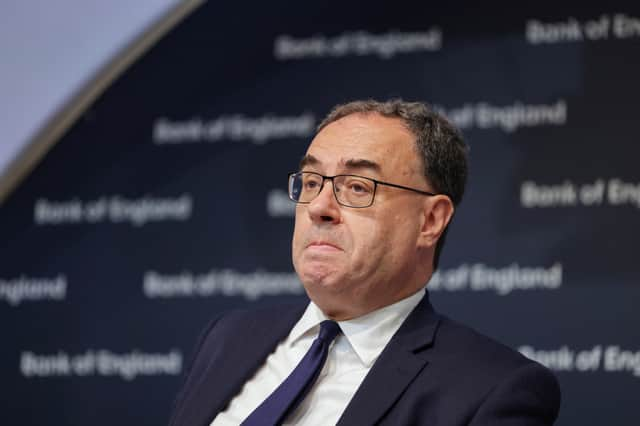Mortgage crisis: almost 1 million homeowners will see payments increase by £500 a month, Bank of England says
and live on Freeview channel 276
Almost one million homeowners with fixed-rate mortgages will see their monthly repayments rise by £500 by the end of 2026, the Bank of England has said.
And while the Bank's Financial Stability Report found that major UK banks will be strong enough to handle the severe economic downturn, small businesses and households will be squeezed by higher interest rates and living costs. The central bank’s stress test found that eight of Britain’s biggest lenders are “resilient” in the face of some of the most extreme economic conditions.
It means it thinks they can handle a scenario involving persistently high inflation, rising global interest rates, deep recessions in the UK and higher unemployment. But the impact of higher interest rates will hit homeowners who have fixed-rate mortgage deals.
The average household will see their monthly interest payments go up by about £220 if they are refinancing during the second half of this year, the Bank said, and will see their rate go up by about 3.25 percentage points.


Nearly a million people could see repayments soar by £500 a month by the end of 2026, while less than half a million could face a monthly jump of more than £750. Some four million fixed-rate mortgage holders are still set to face a hike in borrowing costs between now and the end of 2026.
It follows the Bank lifting the rate to 5% last month, the 13th rise in a row. The last time interest rates were that high was in September 2008, amid the global financial crisis. Economists are expecting rates to be pushed up again next month, and predict that they could peak at between 5.5% and 6%.
Bank of England governor Andrew Bailey said it is the job of monetary policymakers to fight inflation, and borrowers will face the consequences of that. He said: “It is going to have an impact clearly… that is part of the transmission of monetary policy, no question about that.
“What we are seeking to do here… is balance having the transmission of monetary policy with – the two things that I would emphasise – the resilience of the banking system, and the ability to support customers and therefore manage the consequences of this.
“But there will be consequences from increased interest rates I’m afraid because that, from a monetary policy perspective, is why we have to do it.”
In the first instance, NationalWorld recommends speaking to your lender and a mortgage broker to see what rate you can remortgage at, Money Editor Henry Sandercock writes. A broker will be able to provide the best advice on what options will suit you best.
Advice firm the Mortgage Advice Bureau has made several other recommendations for people thinking about their next steps. Its deputy CEO Ben Thompson said: “Those looking to remortgage are faced with a challenging and volatile market. Nevertheless, there are some actionable steps that homeowners coming towards the end of their current fixed-rate deals can, and almost certainly should take.
“Finding out exactly when your current mortgage rate is set to end, your outstanding balance, and how much you currently pay each month is key. From here, you can research what rates are currently available, and what your options might be. [Also] it may feel tough right now, but if you can, review your finances and see if you can make any additional savings in anticipation that your repayments will go up.
“With interest rates likely to go up before they come down, consider locking in a new rate with your lender early. Many lenders will allow you to move onto a new rate three or six months before the official end of your current rate. However, be aware that if mortgage rates do come down, you might find yourself on a higher rate than that available on the market. The important thing here is to get the facts from your lender, so you know what options are available to you.”
Mr Thompson added that checking your credit score and chatting with your lender to see if they have any exclusive deals for loyal customers are also ways of making sure you’ll be in the best position possible to access the best rates.
However the Bank of England said it was in a strong position to support struggling homeowners. In its report, it said: “Although the proportion of income that UK households overall spend on mortgage payments is expected to rise, it should remain below the peaks experienced in the global financial crisis and in the early 1990s.
“UK banks are in a strong position to support customers who are facing payment difficulties. This should mean lower defaults than in previous periods in which borrowers have been under pressure.”
Nevertheless, people are using more credit, and the number of borrowers falling into arrears on their payments ticked up slightly in the first quarter of 2023, the report revealed.
“Further deterioration of households’ finances, including higher mortgage or rental payments, could increase pressures on households, potentially leading to higher consumer credit arrears or default rates,” the Bank cautioned.
Comment Guidelines
National World encourages reader discussion on our stories. User feedback, insights and back-and-forth exchanges add a rich layer of context to reporting. Please review our Community Guidelines before commenting.